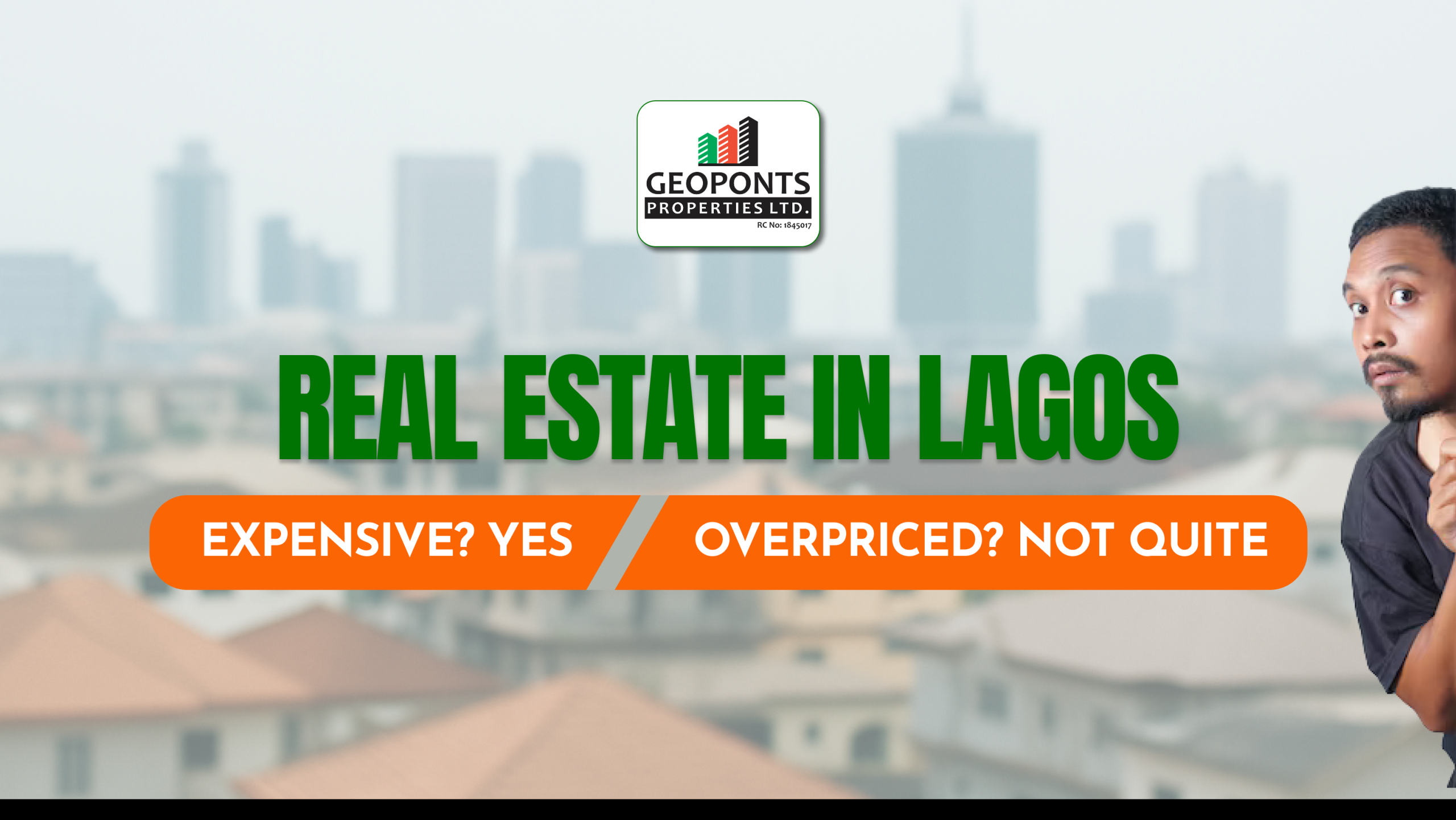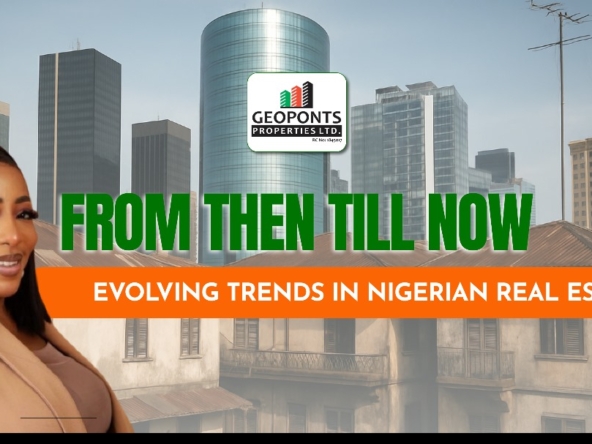If you’ve ever searched for a home, a piece of land, or commercial property in Lagos, chances are you’ve found yourself asking the same question everyone else does: Why is real estate in Lagos so expensive? With soaring prices in places like Lekki, Victoria Island, Ikoyi, Ikeja and even other parts of mainland Lagos, it often feels like you need a fortune just to get a foot in the door.
But here’s the real question, Is it really overpriced? In this article, we’ll break down the reasons behind Lagos’ high real estate prices, explain why it’s justified, and help you understand why investing in this city is not just a smart move, it’s a strategic one.
1. Lagos: The Economic Powerhouse of West Africa
Lagos is Nigeria’s commercial capital and one of Africa’s most dynamic cities. With a population of over 20 million people and counting, Lagos has evolved into a bustling economic epicenter. It contributes over 30% of Nigeria’s GDP and hosts more than 60% of the country’s industrial and commercial activities. The sheer volume of business activities, international corporations, startups, and multinationals based in Lagos makes the demand for real estate sky-high.
Where there’s business, there’s demand for office spaces, homes, hotels, and retail outlets. And in Lagos, demand almost always exceeds supply.
As one of the fastest-growing cities in the world, thousands migrate to the city every day. Whether for job opportunities, education, or simply better living standards, people keep coming to be a part of this economic giant and they all need a place to stay.
This relentless urban migration puts significant pressure on available land, especially in desirable locations. With limited land and an ever-growing population, the natural result is an increase in land and property prices. It’s the simple law of Demand vs Supply.
2. Land Scarcity in Prime Locations
Let’s be honest: There’s only so much land most of Lagos. Most areas are already fully developed or surrounded by bodies of water, leaving little room for new properties.
As land becomes more scarce, it becomes more valuable. Developers must now engage in costly land reclamation projects or build vertically, both of which increase development costs, and ultimately, market prices.
Another major factor contributing to high property prices is the cost of redevelopment. In many high-demand neighborhoods, there’s rarely untouched land waiting to be developed. Instead, developers often have to acquire existing buildings at market value and then bear the cost of demolishing them.
This means they pay twice: once to buy the old property, and again to tear it down before construction even begins. These upfront costs are baked into the final selling price of the new development. So when you see a sleek modern apartment block, remember, it most likely is sitting on the rubble of a 1980s property that wasn’t cheap to acquire or remove.
3. Inflation vs Infrastructure Development = Rising Construction Costs
Inflation and the unstable value of the Naira also impact real estate prices. The cost of building materials like cement, steel, paint, and fittings has risen dramatically over the years due to exchange rate fluctuations and importation bottlenecks.
In response, developers have had to adjust their pricing to reflect the increased cost of delivering quality housing. This trickles down to buyers and investors, but it’s also a necessary adjustment to maintain building standards.
Whenever you hear of new road projects, bridges, flyovers, or rail networks in Lagos, know that the value of real estate in the surrounding areas is about to shoot up. Because these developments increases the desirability of such areas, leading to an increased demand for such areas. Again the laws of Demand vs Supply apply.
Think of how the Lekki-Epe Expressway transformed the corridor into one of the most desirable places to live and work. With the ongoing development of the Lekki Deep Sea Port, Dangote Refinery, and the Lekki-Epe International Airport, the value of real estate in those corridors is not just increasing, it’s exploding.
4. The Status Symbol Factor Birthed High ROI Potential
In Lagos, owning property in certain areas isn’t just an investment, it’s a status symbol. Locations like Banana Island, Ikoyi, and Victoria Island aren’t just addresses; they’re lifestyle statements.
For high-net-worth individuals and corporate players, securing property in these areas comes with prestige, exclusivity, and influence. That, too, contributes to the upward trajectory of pricing in select areas and neighbouring vicinities.
Despite these high costs, real estate in Lagos delivers exceptional returns. Properties bought for ₦10 million five years ago in Lekki are now selling for over ₦40 million and that’s just a conservative example.
Whether through rental income, land flipping, or commercial leases, Lagos remains a hotbed for real estate investment. For long-term investors, the city offers unmatched ROI potential, particularly in rapidly growing districts like Ibeju-Lekki and Epe.
5. Title Documentation and Legal Security
One of the most critical factors influencing real estate prices in Lagos is the title documentation of the property. Properties that come with valid and verifiable title documents such as a Certificate of Occupancy (C of O), Governor’s Consent, or Registered Deed of Assignment tend to be more expensive than those without. And the reason is simple: they offer legal security.
A Certificate of Occupancy is issued by the state government and legally affirms a person’s right to occupy and use the land for a specified term, usually 99 years. It serves as the highest form of proof that a property is genuinely owned, approved, and recognized by the government. Similarly, Governor’s Consent is a legal requirement in any land transaction where there is a transfer of ownership. Without this consent, a land sale can be declared void in court, no matter how much was paid.
In Lagos where land disputes, overlapping claims, and fraudulent transactions are unfortunately very common, title documentation is not just a formality. It’s your insurance policy. A property without proper documentation might appear cheaper upfront, but it comes with hidden risks like:
- Encumbrances (existing claims or loans on the land)
- Multiple sales to unsuspecting buyers
- Government land acquisition or demolitions
- Lengthy and expensive court battles
All these can jeopardize your investment or delay your development plans indefinitely. That’s why serious investors and homebuyers are willing to pay a premium for properties with secure, well-verified titles. it’s more about ownership with confidence.
Think of it as paying for peace of mind. When you invest in a property with clean documentation, you’re not just buying property, you’re securing your legacy, eliminating any stress down the line of owning said property, and avoiding legal headaches that could cost far more in the long run.
So yes, documented properties cost more but in a place like Lagos, they’re worth every naira.
Lagos Real Estate may look expensive on the surface, but when you understand the demand-supply dynamics, the infrastructural developments, and the sheer value the city offers, it becomes clear: it’s a price worth paying.
And remember, the longer you wait, the more expensive it gets. What looks expensive today could be cheap in five years.
At Geoponts Properties Ltd., we love to help you navigate the Lagos real estate market with confidence. Whether you’re looking to buy land, own a home, or invest in the next big opportunity, we’ve got options that suit your budget and vision.
Contact us today to explore premium listings across Lagos, including high-growth areas like Eti-Osa and beyond.
Your future self will thank you.
📍 Visit Us: 781 Somide Odunjinrin Avenue, Omole Phase 2, Ikeja.
📞 Call/WhatsApp: 08084410146 || 07063557501
📩 Email: geopontsproperties@gmail.com
🌐 Website: www.geopontsproperties.com
Let’s help you own your space—where dreams come home.


